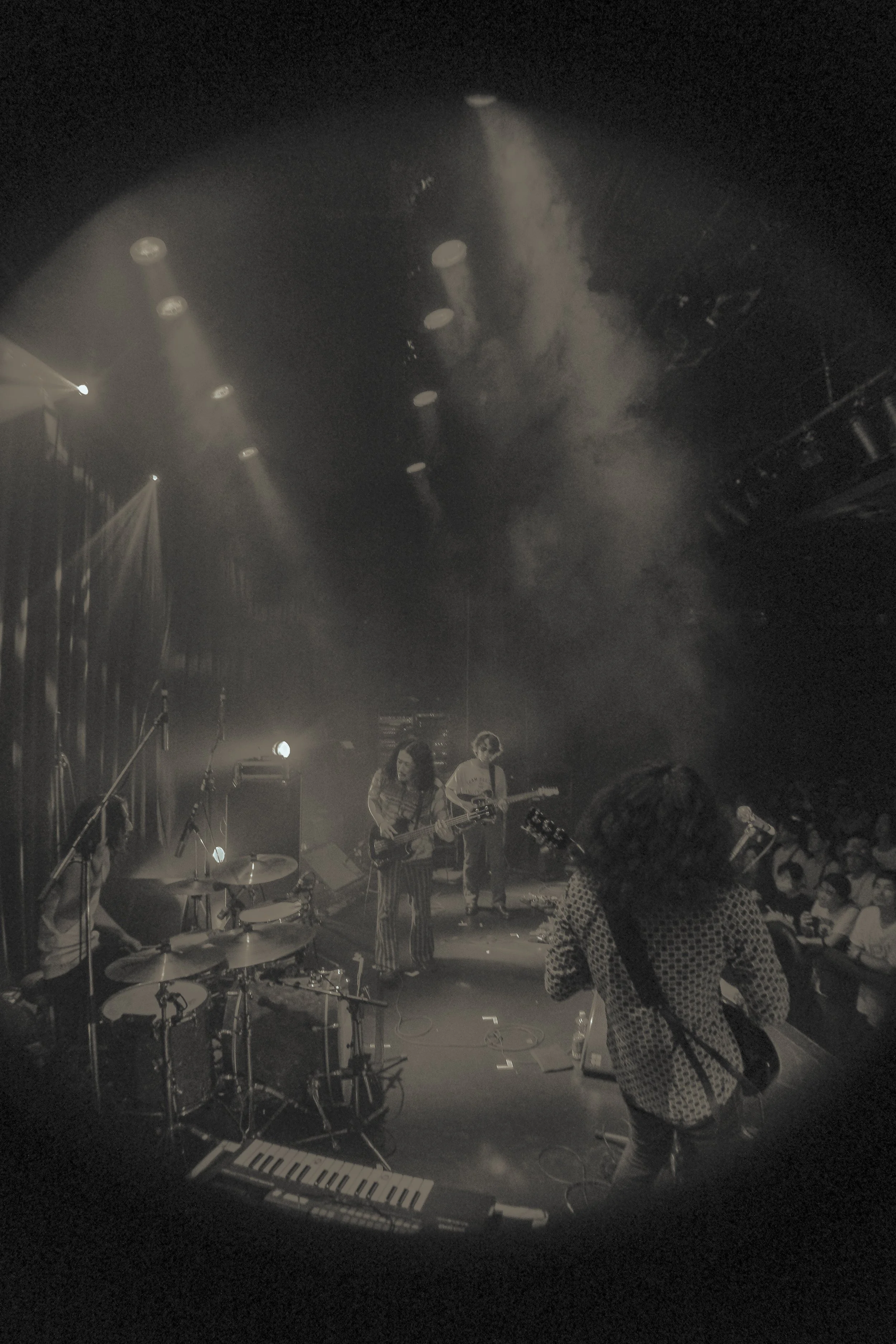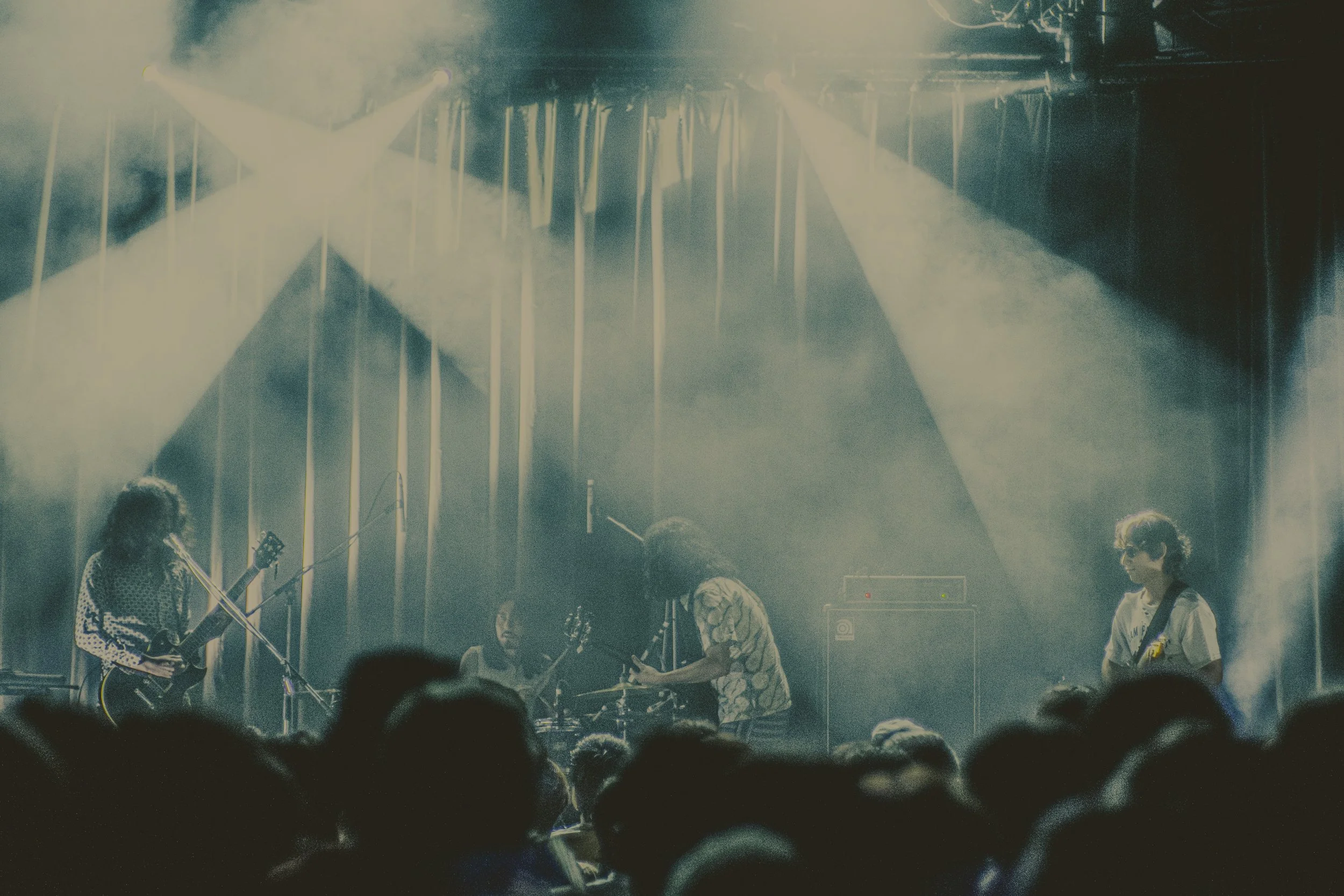Minami Deutsch - Interview
Interview, show review & foreword by Luke Dumpert
photo courtesy of Minami Deutsch
Minami Deutsch have been rattling the skulls of listeners since 2014 with krautrock in their blood and distortion dripping from their fingertips. Their beginnings of playing on the streets of Tokyo led to their inclusion in Krautrock Night hosted at the Tokyo Psych Fest and a subsequent tour of Taiwan.
Three albums, two EPs, and numerous tours later, the Berlin-based Japanese quartet found their way to Fayetteville, Arkansas, for the final headlining show of their tour before joining Earthless as their opening act.
I caught up with frontman Kyotaro Miula to discuss everything from free-jazz, new projects and of course, krautrock.
Check out the interview below!
INTERVIEW
LUKE DUMPERT: I read that the name Minami Deutsch translates to South Germany in Japanese. You're quoted as saying that East and West Germany are historically well known, but you wondered about why North and South weren't. Since you lived in Japan, the North sounded a little dangerous to you, so you chose the South. Is the name Minami Deutsch an intentional homage to the origin of krautrock in Germany?
KYOTARO MIULA: I don't have a special reason. Like the North sounds dangerous, like North Korea or something. The South is always very chill, the weather is good. The North is always cold. That's why I named it South.
LUKE: In your interview with Psychedelic Baby Magazine, you said that you enjoy the music of Eric Dolphy and Don Cherry. How has jazz influenced the way that you approach composing songs for Minami Deutsch?
KYOTARO: It depends on the instrument, song or [if] I sing. Like if I compose the instrument or songs, you need a main melody. And I'm influenced by free jazz. So, I always try to compose kind of weird melodies. Maybe not so weird, but like [a] bit out [there melodies] or something. Like Sun Ra— I love. [But I] especially love Eric Dolphy. I have a CD box set. Because his melodies are quite unique, only one guy [could make this].
LUKE: Is it true that you came up with the name for the label Guru Guru Brain?
KYOTARO: No, Tomo [Katsurada] and Go [Kurosawa] from Kikagaku Moyo. They made it.
LUKE: Is it kind of like an homage to the Krautrock band Guru Guru?
KYOTARO: Maybe a little bit influenced but in Japanese, Guru Guru means dizzy [brained]. Like kind of all over the place. Dizzy brain. Like [taking] acid.
LUKE: You got super into punk rock when you first kind of started getting into music. Tell me about the pipeline from artists like Richard Hell and the Voidoids to bands like Can and Neu!.
KYOTARO: When I was teenager, I tried to listen to 70s punk and Can. But I didn't understand Can. I wanted more [of a fast] beat, like aggression. I also felt that Iggy Pop and the Stooges were boring. I like more hardcore punk. And then one day, I listened to Can again when I was 23 or 24 years old and I was so surprised, you know, because I had listened to them but at the time I felt different. And then [after rediscovering them], it was so cool.
LUKE: Your taste kind of matured and it found its way back to Can.
KYOTARO: Yeah. I didn't understand Krautrock when I was a teenager. But then [as I] grew up, I understood.
LUKE: With Can and Neu! specifically, how do you feel their approach to rhythm and texture within the music inspires the way that you would create your own?
KYOTARO: Neu! and Can, are different, right? Because Neu! is more like punk. The drummer is kind of rough but the Can drummer [Jaki Liebezeit], he was [more of a] jazz drummer. He had the technique, he had skills. But with Neu! I really loved the first and second [album]. But it's kind of only one idea, you know, but Can has something more interesting.
LUKE: Yeah, they had all sorts of different phases, if you will. Like Malcolm Mooney’s time in the band. And then after Damo Suzuki left, they became more instrumental based. What was it like playing with the late Damo Suzuki on 2019's Live at Roadburn?
KYOTARO: We were nervous, I guess. We smoked together before the show and we were so happy. Like a dream come true. It was a total jam session. The concept of the festival was jamming. It was like anything was fine. Damo kept trying to finish so we asked him, ‘more, please,’ because he tried to finish in only like 20 minutes or something. He was older at that point like an uncle. [It felt like] we were taking care of him.
LUKE: Your live shows have heavy psych undertones while keeping the motorik beat of krautrock. What are some of your more psych rock adjacent influences?
KYOTARO: I think the biggest influence actually comes from the members and my friends. I used to live with the guys from Kikagaku Moyo, so naturally that kind of music was always around. But the sound I was really into was krautrock. I think everything’s in there, even the heavy psych stuff.
LUKE: Does incorporating free-jazz elements and dissonance in your instrumental breakdowns allow you to break away from traditional krautrock rigidity and experiment with a more psychedelic, free form structure?
KYOTARO: We didn’t even have any breakdowns in the beginning, but as we kept playing, we started having free parts. Before we knew it, it started to sound a bit like free jazz, though that wasn’t intentional. Sometimes we also set a theme like making it sound like sci-fi movie effects, or like being in heaven.
LUKE: When I watched you live, it felt like you had the crowd in the palm of your hand from the first note. How aware are you of the audience’s energy when performing?
KYOTARO: I’m glad to hear that. Even if I’m not consciously focusing on it, I can naturally feel the audience’s energy. When we’re having fun, that good energy comes back to us like a mirror.
LUKE: How does it affect the direction of your set?
KYOTARO: I think it affects the groove quite a lot. Depending on the energy. Like good or bad. Sometimes, it can even be hard to ride it properly.
LUKE: As your discography has progressed, there's a notable amount of experimentation, both with the sonic landscapes and the genre that you guys play in. On 2022's Fortune Goodies, I sensed more of an electronic element, kind of similar to Harmonia meets Can. Kind of like progressive krautrock, while still maintaining psychedelic sensibilities. What's next for the band?
KYOTARO: Now, I'm editing the next album. With Fortune Goodies, my purpose was [to make something] like Harmonia meets Can. Because I love krautrock, I wanted to make a kind of guide for young people. I'm happy if a young guy finds my band and after that they discover Can. Now, I want to try more like Latin music. I want to change the rhythm a lot but I want to keep it repetitive. I also want to put in new percussion. I want to make something new; I still have passion. I want to change, I don't want to make almost the same album.
LUKE: It's about what's to come. I've noticed that about your music. From album to album, there's a noticeable change in feel. Little by little…
KYOTARO: I feel like some bands try to change a lot where it's just too much sometimes.
LUKE: I am going to give you a list of some German Krautrock-adjacent bands and I want your opinion in one word— Amon Duul II.
KYOTARO: Spooky
LUKE: Are you familiar with the band GÄÄ by chance?
KYOTARO: Underground. I listened to it on YouTube many years ago.
LUKE: What about Faust?
KYOTARO: Punk. Real rock'n'rollers.
LUKE: The last one is Cluster.
KYOTARO: Chill. Cluster is important. Dreamy. Cluster is also innovative with their ambient side
photo courtesy of Minami Deutsch
Review: Minami Deutsch— Live at George’s Majestic Lounge— Fayetteville, Arkansas 10/9/25
If music could explode and reassemble itself in real time, it would sound like Minami Deutsch’s performance at George’s Majestic Lounge in Fayetteville, Arkansas. Songs like “Can’t Get There”, off of the quartet’s 2019 EP of the same name, saw bassist Keita Ise combine thumb-punching the low E string with plucking the high E to create a groove equal parts funky and motorik. The song then erupted like Mount Vesuvius into an electric, free-jazz frenzy. The cacophony of sound crescendoed into a barrage of triplets from drummer Kosei Terunuma, that rained down like the molten rock that plummeted from the skies. In the blink of an eye, a switch was flicked and back into the original composition the band went.
The jam that succeeded “Can’t Get There” began with what felt like an orchestral overture through the sounds of amped up guitars with guitarist Yuichi Ushioda stretching notes until they melted, and guitarist/singer Kyotaro Miula spinning a gravitational field of distortion. The band tumbles head first into a jam akin to a Grateful Dead concert, complete with lights, cameras and marijuana. Terunuma’s syncopated hi-hat rhythm hitting every fourth beat felt like the ticking of a bomb counting down until detonation, while the two guitarists duel and build off each other to eventually become one reverberating organism. Like a Jackson Pollock painting, this is controlled chaos at its finest.
One of the two new, untitled songs played that night felt like a math-rock-blues hybrid with the guitars chasing their own time signatures, while the rhythm section chugged on like a steam-powered engine en route to a hellish landscape. Miula shook his shaker to add to the ambiance of the freaky-styley whooshing, while guitar played dissonant arpeggio patterns that could induce the flight or fight instincts. Miula’s synthesizer counteracts said fears by adding ethereal, happy tones before saying “fuck you,” and destroying the happy tones by turning to the wind screaming at the top of its lungs.
The ineffable chug of the rhythm section was on full display for the band’s coup de grâce, “Tunnel” from 2018’s With Dim Light. The guitars strummed away at the pulse of the crowd with a multitude of differences in melody before convening back to the original composition with more aggression than a cheetah capturing its prey…this might be what the big bang sounded like. The group really achieves the principle of free jazz which is total, unrestricted freedom. They have a truly impressive ability to create noise with sheer dominance and wash it clean of everything with the strum of a single string . The song ended with the sliding of the fingers down the neck to create a swirling effect like you’re about to crash in a spaceship.
If presented the opportunity to catch a show from Minami Deutsch, do not pass on it.



